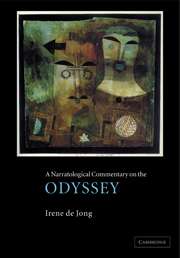Book contents
- Frontmatter
- Contents
- Preface
- Glossary
- Commentary
- Book One
- Book Two
- Book Three
- Book Four
- Book Five
- Book Six
- Book Seven
- Book Eight
- Book Nine
- Book Ten
- Book Eleven
- Book Twelve
- Book Thirteen
- Book Fourteen
- Book Fifteen
- Book Sixteen
- Book Seventeen
- Book Eighteen
- Book Nineteen
- Book Twenty
- Book Twenty-one
- Book Twenty-two
- Book Twenty-three
- Book Twenty-four
- Appendix A
- Appendix B
- Appendix C
- Appendix D
- Appendix E
- Appendix F
- Bibliography
- Index of Greek words
- Index of subjects
Book Nine
Published online by Cambridge University Press: 23 March 2010
- Frontmatter
- Contents
- Preface
- Glossary
- Commentary
- Book One
- Book Two
- Book Three
- Book Four
- Book Five
- Book Six
- Book Seven
- Book Eight
- Book Nine
- Book Ten
- Book Eleven
- Book Twelve
- Book Thirteen
- Book Fourteen
- Book Fifteen
- Book Sixteen
- Book Seventeen
- Book Eighteen
- Book Nineteen
- Book Twenty
- Book Twenty-one
- Book Twenty-two
- Book Twenty-three
- Book Twenty-four
- Appendix A
- Appendix B
- Appendix C
- Appendix D
- Appendix E
- Appendix F
- Bibliography
- Index of Greek words
- Index of subjects
Summary
This book contains the beginning of the Apologue, Odysseus' narrative of his adventures on the way home from Troy (Books 9–12). In the Iliad, too, we find the technique whereby the past – i.e., that part of the fabula † which precedes the main story † – is filled in by characters telling stories; indeed, the technique is a necessary corollary to the in medias res device (cf. 1.10n.). What is new in the Odyssey is the scale on which this technique is employed: Odysseus' narrative, which is continuous except for one intermission (11.333–84), takes up 2,140 lines and recounts a period of ten years. This is by far the longest embedded story † in the Homeric epics and, together with his many lying tales, forms the basis for Odysseus' status as ‘singer’; cf. 11.363–9n.
The Apologue is strategically placed: having arrived at the last station of his adventures abroad, Odysseus looks back on his earlier experiences; despite everything, he has managed to survive, thanks to his shrewdness and endurance. This cannot but bolster his – and the narratees' – confidence with regard to his final ‘adventure’, his arrival home. And for the narratees, the Apologue finally fills in the missing link in Odysseus' ‘piecemeally’ presented nostos; cf. Appendix C.
The Apologue is firmly anchored into the main narrative.
- Type
- Chapter
- Information
- A Narratological Commentary on the Odyssey , pp. 221 - 249Publisher: Cambridge University PressPrint publication year: 2001



